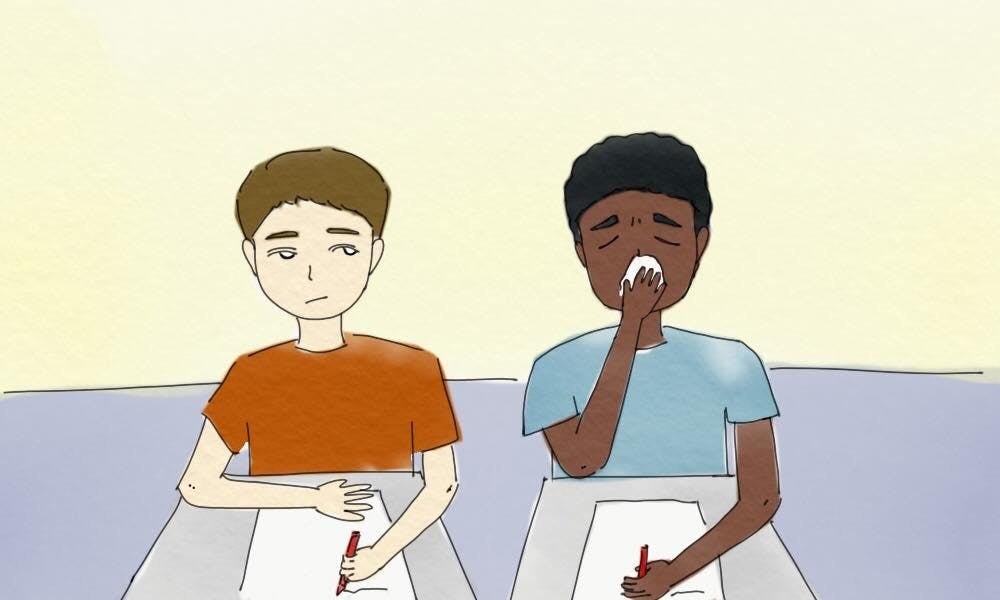
This past finals season was notable in that I experienced the worst testing conditions of my entire academic career. It was smack in the middle of finals week — I had already been struck by several exams prior and was still far from the finish line. I was tired and approximately 20 percent of my body composition was Pret iced coffee and pilfered study break donuts from Van Pelt. I was ready to get my exams over with.
The day of the exam, I found a spot near the front of the testing site with ample distance from other test-takers. I settled in, set out my materials for the exam, and quietly lamented my meager attendance in the course. I didn’t realize that everything would go downhill once everyone else filed in and the exam timer went off.
As if on cue, Hydro Flasks clattered to the floor, the crowded lecture hall became uncomfortably warm, and a student evidently not too ill to sit the exam began to cough loudly, which continued for the duration of the exam. It was difficult for me to even read the exam questions, let alone answer them correctly. Still, I tried my best to focus.
Despite everything else, I was most distracted by the ill student sitting nearby. I have definitely been there myself, feeling sick during a test. However, I never realized the impact this might have on other students until my experience during this particular exam — it was hard to concentrate, and I experienced some second-hand anxiety for the coughing student. So while I was admittedly annoyed at first, I understood later that the sick student was likely compelled by Penn’s regulations on make-up examinations to sit the exam regardless.
Penn’s policy for sick leave of midterm and final exams is reasonable, with most requests approved given a note from Student Health Services or a discussion between student and professor. However, the Registrar’s less-than-ideal final exam makeup scheduling may discourage students from taking this step during finals period. This is because rescheduled final exams due to illness always take place in the first week of the fall or spring semester — after a long break and when the course material is no longer fresh in students’ minds.
This policy inevitably leads to a lose-lose situation. Students can sit out a final exam if they are too ill, but only if they are willing to take an exam up to three months after the conclusion of a course.
To address this situation, one might initially petition the administration to offer alternative final makeup exam dates. However, this isn’t feasible for several reasons. First, the Registrar coordinates the goliath task of scheduling hundreds of examinations across all schools at Penn. It would be double the work to also create individual makeup dates before semester’s end, as opposed to a designated week in the following semester for most makeup exams.
An interesting point to note is that Penn students who have more than two exams on the same day, or a direct time conflict with other exams, are permitted to make-up exams sometime during the finals period. On the other hand, students who are ill, experience death in the family, or are in observance of religious holidays are expected to take final exams the following semester. This discrepancy in policy is likely due to the categorization of the former condition as “out” of student control, and the latter, “in” student control.
While the distinction between these two cases may not be clear at first, Penn’s policy is arguably more lenient than makeup policies at Ivies such as Brown and Yale. They schedule all makeup exams in the subsequent semester, regardless of cause. However, Princeton affords most affected students a 24-hour makeup window, and Harvard also gives students who give sufficient notification a one-day grace period for religious holidays.
The administration may want to consider offering a makeup policy similar to that of Princeton, where students are given a one-day makeup period for cases that include illness and/or religious holidays. However, any proposed change to Penn’s make-up policy will be slow in coming, as a similar version of the current Provost’s policy on final exams has been in effect for at least the past 17 years.
So what is the best solution? It is for Penn students to be vigilant in maintaining personal health throughout the school year, particularly in the weeks leading up to final exams. Entering exams with full health will prevent uncomfortable exam conditions for other students and also lead to much better test results. Otherwise, any student who falls ill at semester’s end should expect to take final exam makeups in the next semester, as this policy will likely be in effect for the foreseeable future at Penn.

JENNIFER LEE is a College sophomore from Fairfax, Va. studying economics. Her email is leej@dailypennsylvanian.com.
The Daily Pennsylvanian is an independent, student-run newspaper. Please consider making a donation to support the coverage that shapes the University. Your generosity ensures a future of strong journalism at Penn.
Donate







